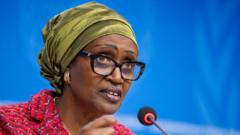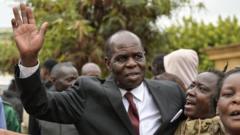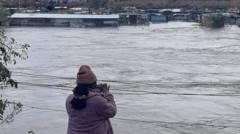The UNAids Executive Director Winnie Byanyima has called on the US government to reverse recent cuts to foreign aid funding, particularly for HIV programmes, which are predicted to undermine years of progress in combating the disease and result in thousands of new infections and deaths.
UNAids Sounds Alarm Over US Funding Cuts That Threaten Global HIV Progress

UNAids Sounds Alarm Over US Funding Cuts That Threaten Global HIV Progress
UNAids chief warns US aid cuts could lead to 2,000 new HIV infections daily and over six million additional deaths in the next four years.
US cuts to foreign aid are expected to have catastrophic impacts on global efforts to combat HIV, according to the UNAids chief, who warned that the reduction in funding could lead to an alarming rise in infections and deaths. Executive Director Winnie Byanyima stated that the US’s decision to pause foreign aid, primarily affecting HIV-support programs, might result in 2,000 new HIV infections each day and over six million deaths within four years.
In stark contrast to the progress made over nearly two decades, in which HIV-related deaths plummeted from over two million in 2004 to around 600,000 in 2023, this rollback could signify a regression in global health efforts. Byanyima urged the US to restore funding urgently, particularly as the repercussions are disproportionately impacting women and girls.
This funding cut stems from President Trump’s halt to foreign aid within his first week in office, initiated as part of a governmental review of spending. The subsequent termination of various programs under the US Agency for International Development (USAID) has led to shutdowns of crucial clinics and shortages of anti-retroviral medicines critical for treating HIV.
Byanyima expressed deep concern about reverting to the dire circumstances of the 1990s when accessing HIV treatment was minimal in poorer nations, leading to soaring infection and mortality rates. She acknowledged past US contributions, which had been a lifeline for many affected communities, but cautioned that the abrupt cessation of support is dangerously undermining recent advancements. There has been little indication that the US is willing to reconsider this course of action.
Moreover, this funding crisis coincides with similarly anticipated cuts from traditional donors in Europe, posing a further risk to UNAids efforts. Byanyima highlighted individual stories, such as that of Juliana from Kenya, who has been adversely affected by the halt of a US-funded program aimed at supporting new mothers to receive necessary treatment.
The situation remains critical as the World Health Organization has identified eight nations potentially on the brink of running out of crucial HIV medications due to the funding freeze. WHO Director Tedros Adhanom Ghebreyesus warned that the interruption of HIV programs might reverse two decades of achievements.
The Treatment Action Campaign (TAC) in South Africa has echoed these concerns, stressing the urgent need for continued access to services for people living with HIV. Byanyima has also extended an olive branch, proposing a deal involving a new ARV developed by Gilead that could help millions while simultaneously creating economic benefits for the US. As funding cuts loom over multiple UN agencies, including UNICEF and the World Food Programme, the broader implications of these decisions demand high-priority attention in the global health arena.






















